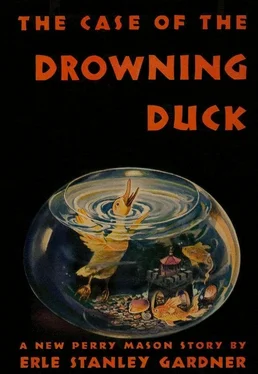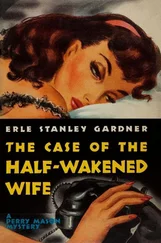“A day or two?”
“Perhaps.”
“And where does that leave you?”
Mason said, “Sitting right in the middle of a volcano that’s due to blow up at any minute. Suppose, Della, you see if you can’t be the perfect hostess and dig up a drink.”
Excitement ran high in El Templo. That John L. Witherspoon had been charged with murder and was having a preliminary hearing before Justice Meehan, was sufficient to bring men into town in large numbers. The case was discussed in restaurants, hotel lobbies, pool halls, and barber shops. There were about as many different theories as there were men discussing the murders.
Lawrence Dormer, the attorney representing Witherspoon, was considered the best trial lawyer in the valley, and Dormer was quite frankly not only puzzled by the evidence, but was taking advantage of every technicality which the law afforded. It was being noised around the streets that Dormer had decided the evidence was sufficient to warrant the judge holding Witherspoon over for trial; that he would, therefore, not disclose his own hand by putting on any witnesses, but would force the district attorney to put as many cards as possible on the table.
Lois Witherspoon, torn between her love for her father and for Marvin Adams, still remained silent concerning her connection with the case; but it was the silence of a tension within which was building up to the bursting point.
Della Street said, “You’re going to have to watch that girl, Chief. She’ll stand up publicly somewhere and spill her story all at once. She isn’t accustomed to concealing things. She’s never bothered to resort to deceit. She likes the truth — and she’s an all-at-once sort of girl.”
Mason nodded.
“Don’t you understand what that means?” Della Street asked.
“What?”
“Down here you’re in foreign territory. You’re in a county where you’re an outsider, where the local people all hang together. Something which might be overlooked in Los Angeles won’t be overlooked here. What would pass as a good trick in the city, will be considered particularly reprehensible down here. Good grief, they may even charge you with being an accessory to the murder before they get done.”
Again Mason smiled.
Knuckles sounded on the door of the hotel suite.
“See who that is, Della.”
Della Street opened the door.
George L. Dangerfield stood on the threshold. “May I come in?” he asked.
“Certainly,” Mason said. “Come on in.”
Dangerfield said, “My wife and I have been subpoenaed as witnesses.”
Mason raised his eyebrows.
“I found out something about the theory on which the district attorney is going to try this case tomorrow, and I thought you should know, because — well, it may have an effect on... on lots of things.”
“What?” Mason asked.
“He’s going to reopen that old case.”
“You mean the Adams case?”
“Yes.”
“Why?”
“Do you remember,” Dangerfield said, “when Witherspoon was talking with you in the hotel there in Palm Springs? He’s reported to have said that if it became necessary, he’d put young Marvin Adams in a position where it would look as though murder was the only way out, and force the boy to show his true character that way.”
Mason smiled. “I never remember anything a client says to me, Dangerfield.”
“Well, the point is,” Dangerfield went on, “that you explained to him what a dangerous idea that was, and there was a little more conversation back and forth along those lines. Well, one of the bar boys, a college lad working at the Springs on his vacation, happened to overhear that conversation. There was a screen behind the table where you were sitting, and this boy was standing back of that screen polishing a window.”
Mason said, “Very interesting. I take it the boy knew Witherspoon?”
“Yes, he recognized him.”
“Very, very interesting, and how did you learn ail this?”
“From the district attorney. The district attorney found out that my wife and I were in town, and subpoenaed us as witnesses. He’s been talking with me about that old case.”
“What did you tell him?” Mason asked.
Dangerfield said, “That’s just the point. I kept telling him that I didn’t see why that should enter into the present case and that there was no use digging up old memories.”
“He’s talked with both you and your wife?”
“No. So far, he’s talked only with me. He’s going to call my wife this evening. I... well, I wanted to see what could be done. I thought perhaps we could take the position that it was making her too nervous — get a doctor to give his certificate or something of that sort. You’re a lawyer. You’ll know how those things are arranged.”
“They aren’t supposed to be arranged,” Mason said.
“I know, but they are just the same.”
“Why doesn’t your wife want to give a statement?”
“We can’t see any use in reopening that old case.”
“Why?”
“Hang it,” Dangerfield blurted, “you know why. My wife told you. She knew that David Latwell had a gun in his pocket when he went to the factory the day he was murdered... And she kept silent about it — all through the case.”
“Did she ever lie about that?”
“No. No one ever asked her. She simply didn’t volunteer the information.”
“So she told you about that?”
“Yes.”
“When?”
“Last night.”
“Highly interesting,” Mason said. “Won’t it be peculiar if, as a result of trying Witherspoon for murder in 1942, we clear up a murder that was committed in 1924?”
“You can’t clear it up,” Dangerfield said. “You might make it appear that a verdict of manslaughter could have been returned. That won’t clear anything up.”
“Or make it appear justifiable self-defense.”
“You can’t bring Adams back to life,” Dangerfield said. “And you might make my wife commit perjury.”
“How?”
“She’ll never admit knowing about that gun when she gets on the witness stand,” Dangerfield said. “She says that if she can meet with you, Witherspoon and Marvin Adams, she’ll tell exactly what happened, but that she’s not going to be held up to public scorn as a woman whose, well, you know.”
“And so?” Mason asked.
“So she sent me to tell you that if you want that old case cleared up, it will have to be done in a private conference. That if she ever takes the stand, she’ll deny the whole business. It’s up to you to keep her from being called.”
Mason pursed his lips. “Will she tell the district attorney anything about the gun?”
“No, of course not.”
Mason pushed his hands down deep in his pockets. “I’ll think it over,” he promised.
It was a new experience for Perry Mason to sit in a courtroom as a spectator — and it was a trying experience.
The expert bronco-buster who sits in the grandstand at a rodeo instinctively sways his body as he watches another rider trying to stay on a bucking horse. The expert pinball-machine player, standing as a spectator, watching another send the metal balls roiling down the inclined plane, will instinctively push with his own body as the balls hit the cushioned bumpers.
Perry Mason, sitting in the front row of the spectators’ chairs in the crowded courtroom at El Templo. listening to the preliminary hearing of the case of The People of the State of California versus John L. Witherspoon, at times would lean forward in his chair as though about to ask a question. When some objection was made, he would grip the arms of the chair as though about to get up and argue the matter.
Читать дальше












